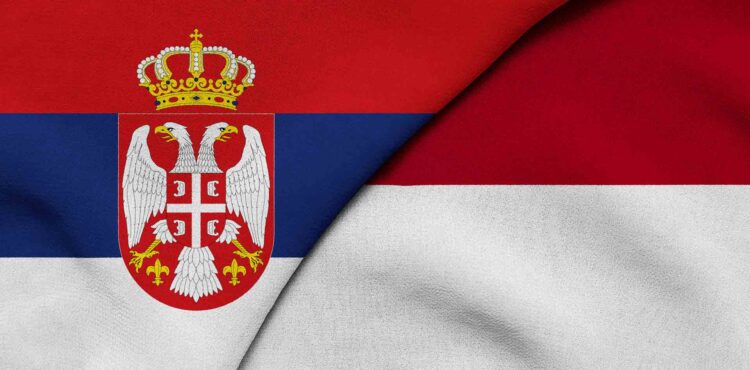Interfaith Relations in Serbia and Indonesia are Harmonious
In the morning of October 25, 2013 Serbian state-religious delegation visited Istiqlal Mosque and the Roman Catholic cathedral in Jakarta.
Then the Reis-ul-Ulema Adem Zilkic and Mufti Muhamed Jusufspahic performed the Friday prayers in Istiqlal mosque.
In the afternoon, our state-religious delegation was received by the President of Indonesia’s Houses of Representatives Marzuki Alie. Having welcomed the members of our delegation and expressed his respect, he said that in June 2013 Indonesian parliamentary delegation visited Serbia and was received at the highest state level. When it comes to religious issues, Alie emphasized that every Indonesian has a constitutional right to freedom of religion. He also stressed that year after year all churches and religious communities record a constant increase.
Patriarch Irinej said that our delegation had the great pleasure to visit “a wonderful and blessed country Indonesia and its people.” His Holiness added that in June 2013 he had an opportunity to exchange his views with the president Ali on interfaith relations in our countries. The patriarch stressed that in Indonesia there is “a harmony between religions and nations.” He drew a parallel with the Edict of Milan which says the same and seems to be “perfectly implemented” in Indonesia, everyone confesses faith, builds temples and transfers his knowledge. Patriarch concluded that Indonesia thus provides an example to the whole world and that religious harmony in the country is “dear both to God and people.” His Holiness thanked Indonesia for sending “wonderful ambassador Samuel Samson” to Serbia.
At the beginning of his address, Director of the Office for Cooperation with Churches and Religious Communities Dr Mileta Radojevic said that the friendship between our two countries, which was established more than fifty years ago, is not fading but getting stronger. Director conveyed gratitude of the Serbian President Tomislav Nikolic for Indonesia’s strong position regarding the preservation of the territorial integrity of Serbia. He quoted the friendly message of the Serbian Prime Minister Ivica Dacic saying that Serbia could be an important link in Indonesia’s cooperation with European countries. Radojevic delivered Marzuki Ali the letter of President Nikolic for the President of Indonesia Susilo Bambang Yudhoyono.
Then, they visited the Ministry of Foreign Affairs of Indonesia where our delegation was received by Deputy Minister Dr. Vardana. He said that the biggest successes in interfaith understanding are achieved through dialogue. Vardana said he hoped the interfaith dialogue between Serbia and Indonesia would continue to give actual results. The Deputy Minister wanted to hear more about interfaith relations in Serbia.
Patriarch Irinej said that interfaith relations in Serbia are harmonious as demonstrated by the composition of our state-religious delegation and added that there are no such relations in Kosovo and Metohija where ethnic Albanians declared independence unilaterally. His Holiness thanked Indonesia for not recognizing the self-proclaimed Albanian secession of Kosovo and Metohija, which he qualified as Serbia’s holy land with over 1,500 churches and monasteries, the greatest shrines of the Serbian people, among which is the seat of the Serbian Patriarchate – The Patriarchate of Pec.
Director Radojevic said to the Deputy Minister that the Serbian state-religious delegation was impressed by the way Indonesia maintains the unity of ethnic groups and religious communities. The experience the state-religious delegation from Serbia gained in Indonesia will be very precious for Serbia. Radojevic repeated that the third bilateral interfaith dialogue between Serbia and Indonesia should be held in Belgrade in 2015.
Serbian state-religious delegation then visited the largest Islamic organization in Indonesia – Nahdlatul Ulama. The leader of this organization Said Aqil Siradj said that Islam has great respect for the Christian faith because it comes from the same source. He added that the wider Nahdlatul Ulama believed that “Islam must be good, polite and modern religion.” He added that the Nahdlatul Ulama was a mediator in resolving religious disputes in the country and that, religious conflicts were usually misused for political purposes.
Patriarch Irinej agreed that religious conflicts arise when politicians abuse religious issues.
Closing arguments during the visit to Nahdlatul Ulama were given by the Reis-ul-Ulema of the Islamic Community of Serbia Adem Zilkic. He said that in “our homeland, Serbia,” there are more than 45 ethnic groups, with seven traditional churches and religious communities. Reis explained that the Islamic community acts as a traditional religious community and is completely equal to other churches and religious communities having the same status. He added that members of the Islamic Community in Serbia belong to seven nations “which means that we have overcome the national way of organization.” Zilkic said that “interfaith relations in Serbia have never been better.” Finally, the Reis-ul-Ulema Zilkic stressed that “after the unilateral declaration of independence, Muslims have found themselves on both sides of the forcibly established border.” Zilkic stressed that “the problems in Kosovo are not religious but ethnic in nature.” Reis Zilkic told to his Indonesian friends to “be careful and not to yield to the unilaterally proclaimed independence of Kosovo.” As a Muslim, Reis asked the officials of Nahdlatul Ulama to support their government in maintaining a consistent position concerning the Kosovo issue so “Muslims would not have to live on two sides of the border.”
The rabbi of the Jewish community in Serbia Isaac Asiel met the professors of the Faculty of Social and Political Sciences at the University of Indonesia, Dr Chusnul Marjah and Dave Lumenta, so as to establish cooperation between our countries in the field of ethnology and anthropology.
This was the end of the visit of our state-religious delegation to Indonesia on the occasion of the Second Bilateral Interfaith Dialogue between Serbia and Indonesia.
The visit was evaluated as very successful.



















